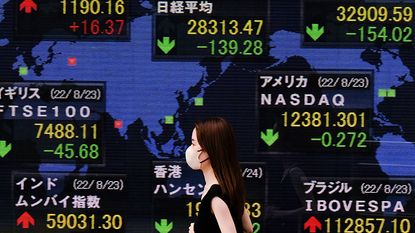What is an index fund?
We outline everything you need to know about index funds, from what they are and how to buy them, to the things to consider before you do so.


Index and tracker funds are a multi-trillion dollar market, but what is an index fund and how do they work?
The first ever index fund was introduced by John Bogle, founder of the Vanguard Group, in 1975. Vanguard is now one of the largest investment firms, and the Vanguard 500 fund still tracks the returns of the S&P 500 nearly 50 years later.
Bogle’s ambition was to make investing easier and more cost-effective for the average investor, saving them the hassle of picking out individual stocks and allowing them to (ideally) profit from all of the stocks in an index at a low cost.
Subscribe to MoneyWeek
Subscribe to MoneyWeek today and get your first six magazine issues absolutely FREE

Sign up to Money Morning
Don't miss the latest investment and personal finances news, market analysis, plus money-saving tips with our free twice-daily newsletter
Don't miss the latest investment and personal finances news, market analysis, plus money-saving tips with our free twice-daily newsletter
What is an index fund?
Index funds copy the composition of an index, such as the FTSE 100 or the S&P 500, aiming to match the index’s return. So, for instance, a FTSE 100 index fund would copy the stocks that make up the FTSE 100 and in theory deliver the same returns.
Index funds, also known as tracker funds, are a type of passive fund. This means they do not have an active manager picking out stocks and attempting to outperform the market, and therefore charge much lower fees.
Because index funds track a wide variety of stocks, they are a good way to diversify your portfolio. They also don’t tend to change their underlying holdings much – they only change when the stocks in the underlying index change.
This stability, combined with their low fees and diversification, means they make for an appealing investment.
You can buy an index fund through fund platforms and brokers, or directly with the company that offers the fund.
What to keep in mind when investing in an index fund
There are two types of index funds: traditional open-ended investment companies (OEICs) and exchange traded funds (ETFs).
ETFs, as their name would suggest, are traded on an exchange and can be bought and sold like a stock. OEICs don’t trade on an exchange, but you can still buy them through your broker.
The two fund classes have different fee structures, which you should consider when deciding which one to buy.
Index funds hold all of the stocks from the index they’re tracking. When investing in one, you want to look for as low a “tracking error” as possible.
The tracking error is the difference between the index’s performance and the performance of the fund. The index fund’s aim is to match the index, so significant overperformance (or underperformance) should raise a red flag.
You should also keep costs in mind. Low fees are part of index funds’ appeal, especially when compared to active funds. Many providers offer index funds and there are many trackers for every stock exchange, so make sure you shop around to secure the best low-cost index fund.
Also, the fees will eat into your return. However, as we’ve said, index-fund fees tend to be quite low, so you’re not going to experience a massive difference.
Index funds track the market regardless of how it’s performing. This might spook investors in market turbulence, but it’s always worth riding that out and waiting for the market to stabilise again before making decisions about selling.
How do index funds compare to active funds?
Actively managed funds justify their higher fees because fund manager and their teams are paid to make strategic decisions about their portfolio. These include what stocks to buy and sell and when to do so.
Index fund managers copy their underlying index and so make far fewer changes, which means operating fees are much lower.
While actively managed funds attempt to beat the market, they rarely ever do so for extended periods of time. This makes it hard to justify the hefty fees, and it’s been one of the main drivers behind index funds’ increase in popularity.
Nic studied for a BA in journalism at Cardiff University, and has an MA in magazine journalism from City University. She joined MoneyWeek in 2019.
-
-
 Investment trust discounts hit 2008 levels. Here’s how to profit
Investment trust discounts hit 2008 levels. Here’s how to profitInvestment trust discounts have risen to levels not seen since 2008, here are three trusts looking to buy to profit.
By Rupert Hargreaves Published
-
 A luxury stock to buy at a high street price
A luxury stock to buy at a high street priceInvestors wrongly consider Watches of Switzerland a high-street outlet.
By Dr Matthew Partridge Published
-
 Investing in wine: how Cru Wine is reaching new audiences
Investing in wine: how Cru Wine is reaching new audiencesTips Gregory Swartberg, founder of fine wine specialist Cru Wine, talks to Chris Carter about how to start a wine collection
By Chris Carter Published
-
 Small companies with big potential
Small companies with big potentialMichael Taylor of Shifting Shares reviews his 2023 picks and highlights more promising minnows.
By Michael Taylor Published
-
 The MoneyWeek portfolio of investment trusts – July 2023 update
The MoneyWeek portfolio of investment trusts – July 2023 updateTips A decade ago we set up the MoneyWeek portfolio of investment trusts. They remain a compelling long-term bet says Rupert Hargreaves
By Rupert Hargreaves Published
-
 Women lead the way with ethical investments
Women lead the way with ethical investmentsDemand for more ethical investments has soared – and women are more likely to opt for them. Annabelle Williams, personal finance specialist at Nutmeg, takes a look at why.
By Annabelle Williams Published
-
 BoE: Mortgage payments to rise by £220 a month for households
BoE: Mortgage payments to rise by £220 a month for householdsMillions of households can expect a mortgage spike of around £200 a month - and some may even reach a extra £1,000 a month, the Bank of England warns
By Marc Shoffman Published
-
 What happened to Thames Water?
What happened to Thames Water?Thames Water, the UK’s biggest water company could go under due to mismanagement and debt. We look into how the company got itself into this position, and what investors should expect.
By Simon Wilson Last updated
-
 Where to invest in the metals that will engineer the energy transition
Where to invest in the metals that will engineer the energy transitionA professional investor tells us where he’d put his money. This week: John Ciampaglia, manager of the Sprott Energy Transition Materials UCITS ETF.
By Nicole García Mérida Published
-
 How investors can profit from high food prices
How investors can profit from high food pricesThe latest furore over grocery prices will die down, says David Stevenson. But the long-term outlook for soft commodities remains bullish. These are the stocks investors can buy to profit from high food prices.
By David J Stevenson Published









